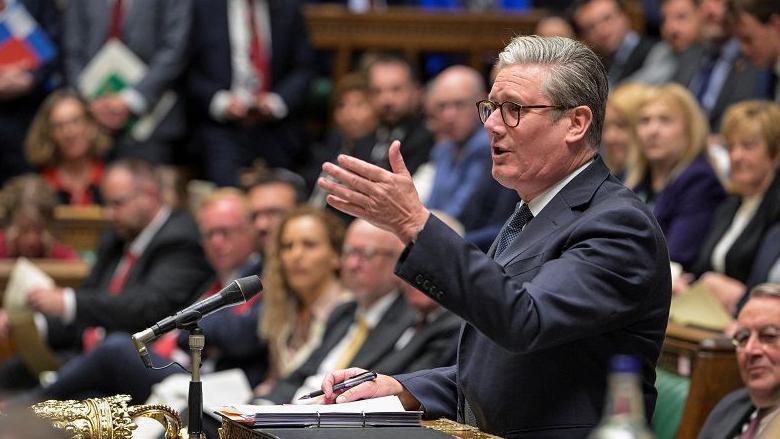Starmer faces growing rebellion over welfare cuts

- Published
Prime Minister Sir Keir Starmer is facing a growing rebellion by Labour MPs over planned welfare cuts some have warned are "impossible to support" without a "change of direction".
In a letter to The Guardian,, external 42 MPs said proposed welfare savings worth £5bn a year by 2030 had "caused a huge amount of anxiety and concern among disabled people and their families".
The MPs urged ministers to delay any decisions until assessments of the potential impact of the cuts on employment and health had been published.
A Department for Work and Pensions (DWP) source said a "determination to help more people into work" was at the heart of the benefits changes.
"We understand that there are concerns," the DWP source added.
"The secretary of state is engaging and talking to colleagues, explaining why these reforms will help transform people's lives."
The letter comes before MPs are expected to vote on a new law that would bring the benefits cuts into effect next month.
On Wednesday, nine Labour MPs spoke during a debate to say they would vote against the changes to a key disability benefit called personal independence payment (Pip) and universal credit (UC).
In Labour's ranks of MPs there has been growing disquiet over the welfare reforms since the party suffered heavy losses in last week's local elections.
In the letter, the 42 MPs said the planned cuts "represent the biggest attack on the welfare state since George Osborne ushered in the years of austerity and over three million of our poorest and most disadvantaged will be affected".
It continued: "Whilst the government may have correctly diagnosed the problem of a broken benefits system and a lack of job opportunities for those who are able to work, they have come up with the wrong medicine. Cuts don't create jobs, they just cause more hardship."
The letter said the benefits system does need reform to tackle "the barriers that disabled people face when trying to find and maintain employment".
"Without a change in direction, the green paper will be impossible to support," it added.
Letters to PM
In March, the government released a green paper to spell out the details of its proposed shake-up of the benefits system.
Overall, the government spends £65bn a year on health and disability-related benefits. Before the government announced the Pip and UC changes, this was projected to increase to £100bn by 2029.
The government estimated that 3.2 million families could be worse off as a result of the reforms, while 3.8 million families will be better off by 2030.
MPs will get a chance to vote on the plans because the government needs to pass primary legislation to make the changes to welfare payments.
The legislation is due to be published this month before making its way through Parliament in June.
The BBC understands some of the signatories are also writing to the prime minister to press for a delay in the vote until the full impact assessment on health and employment is published.
Alongside the welfare cuts, the government has put forward proposals to encourage more people receiving benefits to find work.
The Office for Budget Responsibility (OBR) was unable to say how effective those employment measures would be when it published its assessment of the green paper, citing a lack of detail from the government.
Instead, the OBR plans to include an assessment of this element of the welfare changes in its autumn forecast.
On Wednesday, Disability Minister Sir Stephen Timms defended the proposals, saying it was not sustainable for welfare spending to rise at the current rate.
"The current system produces poor employment outcomes, high economic inactivity, low living standards, high costs to the taxpayer. It needs to change," he said.
"We want a more proactive, pro-work system that supports people better and supports the economy as well."
The BBC has been told some potential rebels are being assured they won't lose the party whip if they abstain – or make themselves scarce – when the vote comes.
The government is not at risk of defeat, given Labour has a large majority, but a sizable rebellion could show the extent of the discontent within the party.
At-a-glance: Key changes to benefits in welfare shake-up
- Published18 March
Benefits crackdown unveiled with aim to save £5bn a year by 2030
- Published18 March

Sign up for our Politics Essential newsletter to keep up with the inner workings of Westminster and beyond.